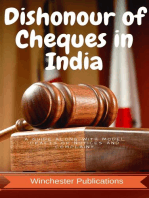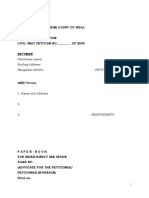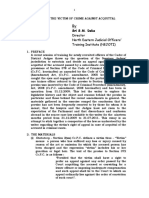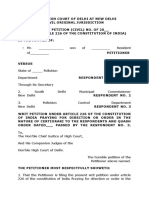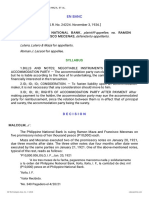Can An Advocate Plead His Own Case
Can An Advocate Plead His Own Case
Uploaded by
abdullah30991Copyright:
Available Formats
Can An Advocate Plead His Own Case
Can An Advocate Plead His Own Case
Uploaded by
abdullah30991Original Description:
Original Title
Copyright
Available Formats
Share this document
Did you find this document useful?
Is this content inappropriate?
Copyright:
Available Formats
Can An Advocate Plead His Own Case
Can An Advocate Plead His Own Case
Uploaded by
abdullah30991Copyright:
Available Formats
CAN AN ADVOCATE PLEAD HIS OWN CASE?
By
Ch. Bashir Ahmed,
Advocate Lahore High Court, Lahore
It has been the practice in the courts throughout that whenever a practicing lawyer has to
appear in his own case, he should not be in uniform. In other words, whenever a practicing
lawyer appears in his own case, he should not be in uniform but should appear as an
ordinary citizen. The precise question which arises for consideration and deliberations is
whether the license issued to an advocate by the respective Bar Council is to appear in the
courts for all other persons except himself or such permission also includes his person. I
have chosen this topic to express my views as an advocate and to solicit views of my
learned colleagues on the subject.
The issuance of a license to practice law is regulated by the Legal Practitioners and Bar
Council Act 1973. Section 22 of the Act which gives an advocate the right to practice is
reproduced below for facility of reference.
"Right of advocate to practice.--(1) Save as otherwise provided in this Act, no person shall
be entitled to practice the profession of law unless he is an advocate.
(2) Subject to Article 207 of the Constitution and the provisions of this Act, the rules made
there under and any other law for the time being in force
(a) any advocate of the Supreme Court or a High Court shall be entitled as of right
to practice throughout Pakistan, and to appear, act and plead before any court or
tribunal in Pakistan; and
(b) any other advocate shall be entitled as of right to practice throughout the
Province for which the Bar Council on whose roll his name is entered has been
constituted, and to appear, act and plead before any court or tribunal in such
Province other than the High Court.
(3) No advocate shall appear or act for any person in any Court or Tribunal unless
he has been appointed for the purpose by such person by a document in writing
signed by such person or his recognized agent or some other person duly authorized
by him to make such appointment, and such document has been filed in such Court
or Tribunal:
Provided that nothing in this subsection shall apply to a Public Prosecutor or any
advocate appointed by the State; or an advocate when appearing on behalf of
another advocate, if the advocate so appearing has filed a memo of appearance.
Provided further that an advocate may be allowed to appear for an accused in
custody on his undertaking to file the document required under this subsection."
The language of section 22 does not put an embargo on a practicing lawyer that he cannot
appear in the court in his personal case and similarly it does not prohibit him to be in uniform
while making such an appearance. The practice in vogue in the courts at present, and at
times so required by courts, needs to be deliberated and discontinued for the reasons given
in the following paragraphs.
(1) On the issuance of a license to practice by the Bar Council such an advocate
acquires a right to appear for other persons, in addition and not in exclusion of his
vested right to appear for himself which he, like any other citizen, held before
obtaining the license to practice.
(2) When a practicing lawyer has to appear in the Court in his personal case, he may
have some other cases of clients fixed on the same day. It will be very difficult, rather
impossible, for him to put off his uniform of an advocate and to put on a civilian dress
while making such appearance and to change it again to appear in the cases of his clients.
There will neither be sufficient time nor suitable place to make such changes of dress.
(3) We have seen many such instances that while arguing some case, the court finds that
the advocate, who is of course in uniform, has prima facie committed contempt of the
court and gives him a notice there and then to explain his position that why he should not
be punished for contempt of court. The offense of contempt of court may be a criminal
offence and the advocate has to defend himself in his personal capacity and not as an
advocate. In such a situation the said advocate cannot be expected to change his uniform
before saying anything in his defense. In some cases the advocate has been sent to the jail
direct from the court which renders the practice of changing uniform impracticable.
(4) In support of the point that the advocate while appearing in his own case retains his
status as an advocate, I will give a concrete example. I am an advocate of the High Court
and I was before a Bench of the Honorable Judges of the Supreme Court in a personal
matter. I was in civilian dress as is the practice in vogue. I had given my office address in
my petition for leave to appeal. I had put the word "Advocate" after my name. The senior
Judge Mr. Justice (Retd) Falak Sher objected to my writing the word "Advocate" after
my name in the address, although I had not put that word after my name where I signed
the petition. The Honorable Judge directed me to delete the word "Advocate" from my
address and I complied with in obedience. But the question remains to be answered
whether my license to be an advocate will be treated as suspended when I give my
address in some petition before any court and when I appear before the court to pursue
that petition.
(5) I quote another instance where such a situation had arisen. I along with some other
persons was appointed a "Member" of a corporate body by the Federal Government. We
all were rendered non functional by the Federal Government by issuing a fresh
notification of appointment of other persons be the expiry of our term of appointment,
which under the law could come to an end only if we resign or the Federal Government
removes us for any of the reasons enumerated in the specific provision of law. My other
co-members asked me to challenge this illegal action of the Federal Government. As I
would have been one of the petitioners in such litigation, I was faced again with the same
situation whether I should appear before the High Court in uniform to present the cases of
other colleagues or in civilian dress to present my own case, simultaneously. For this
reason I could not take up this case which professionally I could do.
The above situation gives rise to another important question relating to fundamental
rights. Under Article 18 of the Constitution of Pakistan it is my fundamental right to enter
upon any lawful profession and the legal profession is definitely a lawful profession. I
could not pursue this lawful profession and accept the case of my other colleagues and
take up joint proceedings because of the practice in the courts that I could - not appear in
uniform in such joint proceedings. In such eventuality, the present practice of the courts
comes in conflict with fundamental right to pursue any lawful profession, which is
guaranteed by the Constitution.
(6) Now we examine this issue from a different angle. A doctor wears a uniform while
performing his duty in the hospital but he can also give medical treatment to himself or to
some other family member. An engineer wears a uniform at work but can also attend to
his personal matters while in such uniform. An army man, police man and in short every
other person while in uniform can attend to his personal matters then why an advocate
while in uniform cannot attend to his personal matters, including appearance in courts in
a personal case, without any deform or reform in his dress. Thus if an advocate is not
permitted to appear in uniform, this would also amount to discrimination which is not
permissible under the law.
As I have stated above, I confront my colleagues in the profession of law to consider the episode
and make deliberations to find some workable solution. I would also make a sincere request to
the honourable courts to reconsider the present practice of not allowing the practicing advocates
to appear in the court in personal matters while in uniform. (I will be available on cell no
03008422691 to answer any query).
You might also like
- (1972) 83 ITR 26 (SC) (04-08-1969) Hindustan Steel Ltd. vs. State of OrissaDocument5 pages(1972) 83 ITR 26 (SC) (04-08-1969) Hindustan Steel Ltd. vs. State of OrissaRamanathan seshanNo ratings yet
- Court Fee-RefundDocument6 pagesCourt Fee-RefundSaddy MehmoodbuttNo ratings yet
- K.L. Gauba CaseDocument3 pagesK.L. Gauba CaseAakashNo ratings yet
- Dishonour of Cheques in India: A Guide along with Model Drafts of Notices and ComplaintFrom EverandDishonour of Cheques in India: A Guide along with Model Drafts of Notices and ComplaintRating: 4 out of 5 stars4/5 (1)
- Shabana Bano Vs Imran Khan CaseDocument14 pagesShabana Bano Vs Imran Khan Casevishwas jaiswalNo ratings yet
- CPC SaleDocument19 pagesCPC SaleRoma GillNo ratings yet
- Transfer Application FormDocument3 pagesTransfer Application Formप्रदीप मिश्रNo ratings yet
- Sample Writ Petiton SCDocument7 pagesSample Writ Petiton SCKhushali OzaNo ratings yet
- FORMAT (Bail)Document5 pagesFORMAT (Bail)Uditanshu MisraNo ratings yet
- Execution PetitionDocument19 pagesExecution PetitionShashank KanigiriNo ratings yet
- Legal Notice To MCD COMMISSIONERDocument2 pagesLegal Notice To MCD COMMISSIONERKunwar Naresh Kumar0% (1)
- Quashing FirDocument2 pagesQuashing FirShree Joytish Sansthan100% (1)
- In The Court of LD Civil Court at HowrahDocument1 pageIn The Court of LD Civil Court at HowrahSanwar MiddyaNo ratings yet
- Notice of Motion 1display - PDFDocument3 pagesNotice of Motion 1display - PDFVarsha MangtaniNo ratings yet
- Form No 45 Bail BondDocument5 pagesForm No 45 Bail BondKulwinder SinghNo ratings yet
- Jail Transfer ApplicationDocument3 pagesJail Transfer ApplicationNavjit Singh Bajwa100% (1)
- Suit On The Ground of Adverse PossessionDocument15 pagesSuit On The Ground of Adverse PossessionAanchal KashyapNo ratings yet
- CMP NoticeDocument1 pageCMP NoticePrakashNo ratings yet
- Format of An Interpleader SuitDocument2 pagesFormat of An Interpleader SuitFaiz Malhi100% (1)
- Appeal by Victim Against Acquittal by SM DekaDocument12 pagesAppeal by Victim Against Acquittal by SM DekavishchandraNo ratings yet
- DowryDocument11 pagesDowryLive Law50% (2)
- Section 326 IPC New PDFDocument16 pagesSection 326 IPC New PDFLatest Laws TeamNo ratings yet
- 309 Petn FormatDocument2 pages309 Petn FormatmnagashyamNo ratings yet
- Notice U:s 106 TpaDocument1 pageNotice U:s 106 Tpaabhinandan khanduriNo ratings yet
- Order 26 Rule 9 of CPCDocument6 pagesOrder 26 Rule 9 of CPCPriya R50% (2)
- Application Under Order 39, Rule 7 of The C. P. C.Document2 pagesApplication Under Order 39, Rule 7 of The C. P. C.namanNo ratings yet
- Y. Narasimha Rao and Ors Vs Y. Venkata Lakshmi and Anr On 9 July, 1991Document10 pagesY. Narasimha Rao and Ors Vs Y. Venkata Lakshmi and Anr On 9 July, 1991Srikanth Bharadwaj100% (1)
- Notice of MotionDocument7 pagesNotice of MotionJimmy Fernandis100% (1)
- Bail File Put Up FormatDocument1 pageBail File Put Up Formatsamual bhatti0% (1)
- Ballb 501 PDFDocument43 pagesBallb 501 PDFoneNo ratings yet
- Amith LM Civil Law Memo MCIDocument23 pagesAmith LM Civil Law Memo MCIalanj0482No ratings yet
- Complaint No - ofDocument3 pagesComplaint No - ofAayushNo ratings yet
- Application For Setting Aside Ex Parte DecreeDocument5 pagesApplication For Setting Aside Ex Parte DecreenageshNo ratings yet
- RejoinderDocument4 pagesRejoinderzenith chhablaniNo ratings yet
- Final DraftingDocument77 pagesFinal Drafting01 Aayush ShrivastavaNo ratings yet
- Format of 317 CRPC Petition SampleDocument2 pagesFormat of 317 CRPC Petition Sampleபூவை ஜெ ரூபன்சார்லஸ்No ratings yet
- Mischief Rule of Interpretation: (Reason For Law)Document12 pagesMischief Rule of Interpretation: (Reason For Law)st dharmaNo ratings yet
- Right To Property Before 44 Amendment To The Indian ConstitutionDocument16 pagesRight To Property Before 44 Amendment To The Indian ConstitutionOnindya MitraNo ratings yet
- Supreme Court Vakalatnama SpeakasiaDocument1 pageSupreme Court Vakalatnama SpeakasiaPremasis SatmanNo ratings yet
- Bail ApplicationDocument8 pagesBail ApplicationAdvocate Ronak ShahNo ratings yet
- Exemption ApplicationDocument15 pagesExemption ApplicationRohit BhanushaliNo ratings yet
- Court Diary/Internship Report - Central University of KashmirDocument53 pagesCourt Diary/Internship Report - Central University of KashmirHaider RasoolNo ratings yet
- PUNJAB NATIONAL BANK BOMBAY vs. K B SHETTYDocument4 pagesPUNJAB NATIONAL BANK BOMBAY vs. K B SHETTYAnkur RastogiNo ratings yet
- Writ Petition Seeking Writ of Certiorari in High Court Under Article 226 of Constitution To Quash Order of RespondentDocument4 pagesWrit Petition Seeking Writ of Certiorari in High Court Under Article 226 of Constitution To Quash Order of Respondentsaurabh singhNo ratings yet
- Application For CorrectionDocument1 pageApplication For Correctionarun7590852095No ratings yet
- Workshop III Material PDFDocument55 pagesWorkshop III Material PDFVishnu Varthan100% (1)
- Central Delhi Court Bar Appl Form-2Document2 pagesCentral Delhi Court Bar Appl Form-2Sanjeev kumar0% (1)
- Appearance PursisDocument1 pageAppearance PursissataraladcsNo ratings yet
- Application For Appointment of ReceiverDocument3 pagesApplication For Appointment of ReceiverAnujNo ratings yet
- Application For Permission To File SLPDocument2 pagesApplication For Permission To File SLPMegha kumariNo ratings yet
- MAHARERA Judgement For Delay of Flat PossessionsDocument14 pagesMAHARERA Judgement For Delay of Flat PossessionsMahadeoNo ratings yet
- Ethics CasesDocument14 pagesEthics Casesraj100% (1)
- Transfer Petition Under Section 411 Cr.P.C-DraftDocument2 pagesTransfer Petition Under Section 411 Cr.P.C-DraftSanjay Mandyal100% (1)
- Application For Setting Aside Arbitral AwardDocument9 pagesApplication For Setting Aside Arbitral AwardPreeminentPriyanka100% (1)
- 1 - Company and Other Forms of Business OrganisationsDocument7 pages1 - Company and Other Forms of Business OrganisationsAnonymousNo ratings yet
- D. M., Aravali Golf Club v. Chander Hass - 27-35Document9 pagesD. M., Aravali Golf Club v. Chander Hass - 27-35knkmuraliNo ratings yet
- Justice Chelameswar's JudgmentDocument43 pagesJustice Chelameswar's JudgmentThe Wire100% (1)
- Rajasthan Rent Control (Amendment) Act, 2017Document9 pagesRajasthan Rent Control (Amendment) Act, 2017Harshit Singh ChandelNo ratings yet
- A Simple Guide for Drafting of Conveyances in India : Forms of Conveyances and Instruments executed in the Indian sub-continent along with Notes and TipsFrom EverandA Simple Guide for Drafting of Conveyances in India : Forms of Conveyances and Instruments executed in the Indian sub-continent along with Notes and TipsNo ratings yet
- Press Freedom and Its Limitations: Lesson 10Document13 pagesPress Freedom and Its Limitations: Lesson 10Kyla DagdagNo ratings yet
- Section 13 in The Family Courts ActDocument4 pagesSection 13 in The Family Courts ActpraharshithaNo ratings yet
- People Vs Villorente, G.R. No. 100198Document9 pagesPeople Vs Villorente, G.R. No. 100198Johnric PandacNo ratings yet
- Relate: General Data Protection Regulation (GDPR)Document8 pagesRelate: General Data Protection Regulation (GDPR)Panos CayafasNo ratings yet
- 1926-Philippine National Bank v. MazaDocument3 pages1926-Philippine National Bank v. MazaKathleen MartinNo ratings yet
- Compilations in CDIDocument166 pagesCompilations in CDIBencio AizaNo ratings yet
- (U) Daily Activity Report: Marshall DistrictDocument6 pages(U) Daily Activity Report: Marshall DistrictFauquier NowNo ratings yet
- 103 Legarda Vs Saleeby (31 Phil 590)Document7 pages103 Legarda Vs Saleeby (31 Phil 590)Jose Salve CabilingNo ratings yet
- PEOPLE v. ALVARIODocument1 pagePEOPLE v. ALVARIOBaphomet Junior100% (1)
- Tds Details For The Year 2019-20: This Report Is Generated On 30-Mar-2021 17:15:09 PMDocument2 pagesTds Details For The Year 2019-20: This Report Is Generated On 30-Mar-2021 17:15:09 PMSaksham SinghalNo ratings yet
- Bhogun R Ors V Surroop H Ors 2021 SCJ 209 - 0Document9 pagesBhogun R Ors V Surroop H Ors 2021 SCJ 209 - 0François Giles EcroignardNo ratings yet
- Henry Lee McCone v. Wyoming Attorney General Judie L. Chitwood Judy Uphoof, 162 F.3d 1173, 10th Cir. (1998)Document2 pagesHenry Lee McCone v. Wyoming Attorney General Judie L. Chitwood Judy Uphoof, 162 F.3d 1173, 10th Cir. (1998)Scribd Government DocsNo ratings yet
- RHB V Kwan Chew Holdings SDN BHDDocument12 pagesRHB V Kwan Chew Holdings SDN BHDFarah AzuinNo ratings yet
- De Joya Versus Judge Placido Marquez2023099426 PDFDocument1 pageDe Joya Versus Judge Placido Marquez2023099426 PDFMabeth AbarcarNo ratings yet
- Supreme Court Judgment On Effect of Parental Discord On ChildrenDocument34 pagesSupreme Court Judgment On Effect of Parental Discord On ChildrenLatest Laws TeamNo ratings yet
- Case 1: Youngstown Sheet & Tube Co. v. SawyerDocument4 pagesCase 1: Youngstown Sheet & Tube Co. v. Sawyerapi-595424641No ratings yet
- VanExel v. Georgia Department of Corrections Et Al - Document No. 4Document8 pagesVanExel v. Georgia Department of Corrections Et Al - Document No. 4Justia.comNo ratings yet
- Con Law - Outline 2Document51 pagesCon Law - Outline 2Justin BouchardNo ratings yet
- Hasenfeld Letter To CCRBDocument9 pagesHasenfeld Letter To CCRBKeegan StephanNo ratings yet
- Crim Soc CompilationDocument65 pagesCrim Soc Compilationgenelord opallaNo ratings yet
- Law Gat Test Qso (1) - 1Document4 pagesLaw Gat Test Qso (1) - 1Ammar Ali0% (1)
- Sangguniang Bayan vs. Court of Appeals, G.R. No. 118883, 16 January 1998Document2 pagesSangguniang Bayan vs. Court of Appeals, G.R. No. 118883, 16 January 1998Myrna B Roque100% (1)
- FDFFDFDocument99 pagesFDFFDFggdghnhfh100% (1)
- Title 1-Crimes Against National Security and Law of NationsDocument2 pagesTitle 1-Crimes Against National Security and Law of NationsUnica Amor Mananquil100% (1)
- Constitutional Law Review 1 SyllabusDocument30 pagesConstitutional Law Review 1 SyllabusMelvin L. TomarongNo ratings yet
- The Republic of Ghana Vs Charles Wereko-Brobbey and Kwadwo Okyere MpianiDocument27 pagesThe Republic of Ghana Vs Charles Wereko-Brobbey and Kwadwo Okyere Mpianixebieso100% (2)
- Sample OnlyDocument5 pagesSample OnlyJem TolentinoNo ratings yet
- United States Air Force Court of Criminal AppealsDocument6 pagesUnited States Air Force Court of Criminal AppealsScribd Government DocsNo ratings yet
- People v. TaneoDocument1 pagePeople v. TaneoJaime NikolaiNo ratings yet
- Vicmar Dev't Corp Vs Elarcosa, Et - Al. - Labor LawDocument1 pageVicmar Dev't Corp Vs Elarcosa, Et - Al. - Labor LawAdremesin-severino HoneeNo ratings yet



